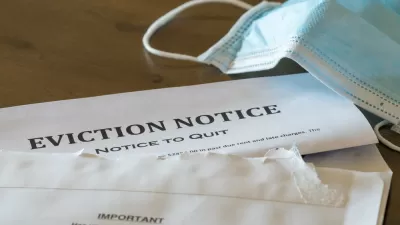The majority opinion claims the CDC overstepped its authority and calls for congressional approval of any further eviction moratoriums.

In a decision split between the Court's conservative and liberal justices, the Supreme Court "rejected the Biden administration’s latest moratorium on evictions, ending a political and legal dispute during a public health crisis in which the administration’s shifting positions had subjected it to criticism from adversaries and allies alike."
As reported by Adam Liptak and Glenn Thrush, "[t]he decision puts hundreds of thousands of tenants at risk of losing shelter, while the administration struggles to speed the flow of billions of dollars in federal funding to people who are behind in rent because of the coronavirus pandemic and its associated economic hardship."
The Court's decision stated that the Centers for Disease Control and Prevention (CDC) "had exceeded its authority" by using a "a decades-old statute that authorizes it to implement measures like fumigation and pest extermination" to impose a sweeping eviction moratorium. According to the majority opinion, "[i]f a federally imposed eviction moratorium is to continue, Congress must specifically authorize it."
A statement from the White House criticized the decision, saying "[a]s a result of this ruling, families will face the painful impact of evictions, and communities across the country will face greater risk of exposure to Covid-19." States such as New York and California have extended their own eviction moratoriums as they struggle to distribute the millions in rental assistance funds that remain stuck in bureaucratic limbo.
FULL STORY: Supreme Court Ends Biden’s Eviction Moratorium

Maui's Vacation Rental Debate Turns Ugly
Verbal attacks, misinformation campaigns and fistfights plague a high-stakes debate to convert thousands of vacation rentals into long-term housing.

Planetizen Federal Action Tracker
A weekly monitor of how Trump’s orders and actions are impacting planners and planning in America.

Chicago’s Ghost Rails
Just beneath the surface of the modern city lie the remnants of its expansive early 20th-century streetcar system.

Bend, Oregon Zoning Reforms Prioritize Small-Scale Housing
The city altered its zoning code to allow multi-family housing and eliminated parking mandates citywide.

Amtrak Cutting Jobs, Funding to High-Speed Rail
The agency plans to cut 10 percent of its workforce and has confirmed it will not fund new high-speed rail projects.

LA Denies Basic Services to Unhoused Residents
The city has repeatedly failed to respond to requests for trash pickup at encampment sites, and eliminated a program that provided mobile showers and toilets.
Urban Design for Planners 1: Software Tools
This six-course series explores essential urban design concepts using open source software and equips planners with the tools they need to participate fully in the urban design process.
Planning for Universal Design
Learn the tools for implementing Universal Design in planning regulations.
planning NEXT
Appalachian Highlands Housing Partners
Mpact (founded as Rail~Volution)
City of Camden Redevelopment Agency
City of Astoria
City of Portland
City of Laramie





























